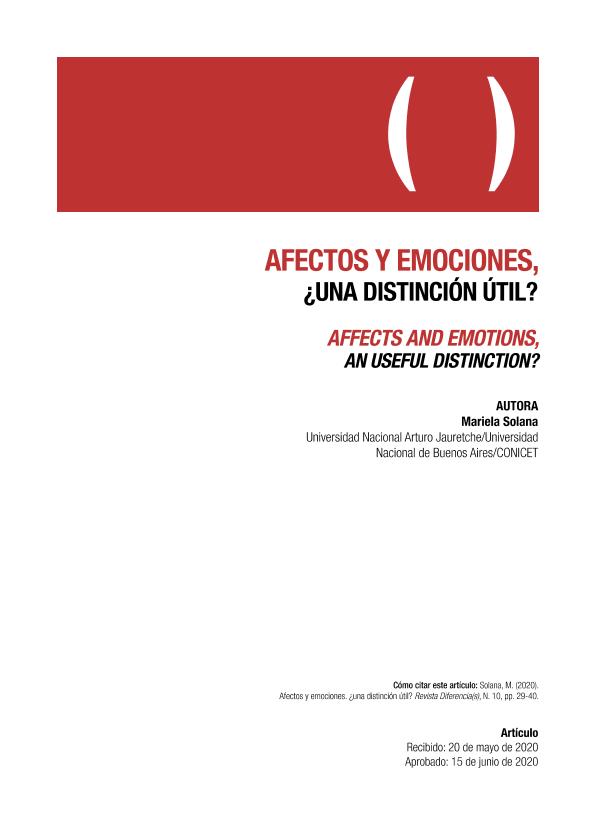Mostrar el registro sencillo del ítem
dc.contributor.author
Solana, Mariela

dc.date.available
2022-05-09T11:28:53Z
dc.date.issued
2020-10
dc.identifier.citation
Solana, Mariela; Afectos y emociones: ¿Una distinción útil?; Universidad de Buenos Aires. Facultad de Ciencias Sociales. Instituto de Investigaciones Gino Germani. Grupo de Estudios sobre Estructuralismo y Posestructuralismo; Diferencia(s); 1; 10; 10-2020; 29-40
dc.identifier.issn
2469-1100
dc.identifier.uri
http://hdl.handle.net/11336/156877
dc.description.abstract
El objetivo principal de este artículo es explorar por qué una vertiente del giro afectivo crea una división fuerte entre afectosy emociones así como determinar si esto es útil para las humanidades y las ciencias sociales. La tesis que aquí se defiendees que el problema no es la diferencia entre sensaciones no-concientes (afectos) y expresiones discursivas (emociones) sinolo que se construye sobre ella. Lo controversial de los afectos es que funcionan como un caballo de Troya: tras la fachada deuna defensa inocente de las sensaciones se esconde una visión errónea de lo emocional, de lo social y del lenguaje así comouna celebración unilateral de la espontaneidad del cuerpo. Para demostrar eso, se toma como objeto de análisis principal lasprimeras partes de Parables for the Virtual (2002) de Brian Massumi.
dc.description.abstract
The main goal of this paper is to explore why a part of the affective turn creates a strong division between affects and emotions and to determine if this is useful for the humanities and social sciences. The main argument of this article is that the problem is not the difference between non conscious sensations (affects) and linguistic expressions (emotions), but rather what gets smuggled with this. What is controversial about affects is that they play the role of a Trojan horse: behind the facade of an innocent defense of sensations, there is a wrong conception of emotions, society and language and a unidirectional celebration of the spontaneity of the body. In order to prove this, I shall examine the first parts of Parables for the Virtual (2002) by Brian Massumi.
dc.format
application/pdf
dc.language.iso
spa
dc.publisher
Universidad de Buenos Aires. Facultad de Ciencias Sociales. Instituto de Investigaciones Gino Germani. Grupo de Estudios sobre Estructuralismo y Posestructuralismo
dc.rights
info:eu-repo/semantics/openAccess
dc.rights.uri
https://creativecommons.org/licenses/by/2.5/ar/
dc.subject
AFECTOS
dc.subject
EMOCIONES
dc.subject
MASSUMI
dc.subject
GIRO AFECTIVO
dc.subject
HISTORIA
dc.subject.classification
Filosofía, Historia y Filosofía de la Ciencia y la Tecnología

dc.subject.classification
Filosofía, Ética y Religión

dc.subject.classification
HUMANIDADES

dc.title
Afectos y emociones: ¿Una distinción útil?
dc.title
Affects and emotions: An useful distinction?
dc.type
info:eu-repo/semantics/article
dc.type
info:ar-repo/semantics/artículo
dc.type
info:eu-repo/semantics/publishedVersion
dc.date.updated
2022-05-02T17:15:11Z
dc.journal.volume
1
dc.journal.number
10
dc.journal.pagination
29-40
dc.journal.pais
Argentina

dc.description.fil
Fil: Solana, Mariela. Consejo Nacional de Investigaciones Científicas y Técnicas; Argentina. Universidad de Buenos Aires. Facultad de Filosofía y Letras. Instituto Interdisciplinario de Estudios de Género; Argentina. Universidad Nacional Arturo Jauretche; Argentina
dc.journal.title
Diferencia(s)
dc.relation.alternativeid
info:eu-repo/semantics/altIdentifier/url/http://www.revista.diferencias.com.ar/index.php/diferencias/article/view/206
Archivos asociados
